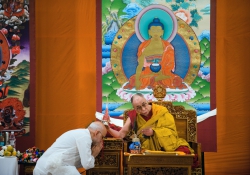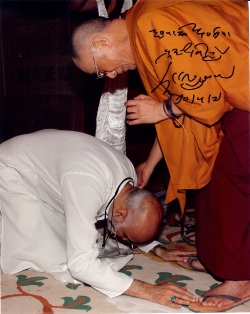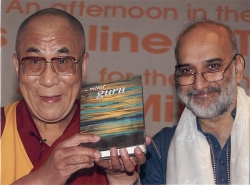His Holiness the Dalai Lama's Personal Student, Rajiv Mehrotra
The Trustee the Dalai Lama's Foundation for Universal Responsibility
A close personal student of His Holiness the Dalai Lama, Rajiv Mehrotra is the Trustee and Secretary of the Foundation for Universal Responsibility, established by the 14th Dalai Lama with the Nobel Peace Prize funds he received in 1989. In addition, he is a writer, television producer and director, and a documentary filmmaker. He is also well known as the acclaimed host for over 20 years of In Conversation: one of India’s longest running talk shows on public television, that features distinguished interviewees including heads of state and Nobel Laureates. He has published nine books in more than 50 editions and a dozen languages. Mehrotra was educated at the University of Delhi, Oxford University and Columbia University, where he earned a Master of Fine Arts in film direction. He has been managing trustee, executive producer and commissioning editor of the Public Service Broadcasting Trust, which has produced more than 650 independent documentary films that have won more than 230 awards from 1,300 film festival screenings. He has also served on the Government of India’s Steering Committees of the Planning Commission to recommend policy and strategies for information broadcasting and dissemination of information technology. He addressed two plenary sessions at the World Economic Forum in Davos, Switzerland, held earlier in 2016. At the Forum he was nominated “Global Leader for Tomorrow.” Tokyo Journal Executive Editor Anthony Al-Jamie spoke with Rajiv Mehrotra on the occasion of the 80th birthday celebrations of His Holiness the Dalai Lama, about his long association with His Holiness the Dalai Lama as a student, and the lessons that he has tried to learn from his spiritual guide. Among the many issues that he discussed, particularly significant is the one on the challenges of practicing compassion.

TJ: What inspired you to work with His Holiness the Dalai Lama?
MEHROTRA: I had the good fortune of meeting His Holiness the Dalai Lama in the early 1980s. I was privileged and blessed to have accompanied him to Oslo for the award ceremony. I have been honored to have helped set up the Foundation on his behalf to further his secular passions and agendas that he stood for. Fortunate serendipity, more than any conscious planning on my part, brought me this rare opportunity of working for His Holiness despite my many limitations.
TJ: What did you think about the 80th birthday celebration for the Dalai Lama in Orange County, California?
MEHROTRA: It was an extremely well-organized event and it gave us an opportunity not only to engage with His Holiness, but to also connect with the many diverse participants who had come together to honor and celebrate not just a pre-eminent Buddhist monk, but a great statesman for our troubled times. The willingness and enthusiasm of the people in the United States to learn from His Holiness, and their acceptance of principles that are rather different from the American society’s, is truly amazing. Despite the reputation of being a materialistic and consumerist society, millions of Americans are willing to learn, interrogate and engage with ideas that are very different. is motivation has sustained itself over decades and is very encouraging given the enormous potential of the United States for good. Over the years, I have marveled at the ease with which His Holiness is able to connect with all kinds of people in a matter of a few seconds. Often all that it seems to need is for them to read his books or just see him to feel a tremendous sense of connectedness with him. I believe that this is because, setting aside cold logic and analytic reasoning, he radiates great empathy and compassion so that we feel understood and loved. We know he walks his talk with great humility.
"There is no instant grati cation on the journey to becoming a better human being."
TJ: Is he always compassionate or have you seen His Holiness get angry?
MEHROTRA: I have not seen His Holiness angry, although I’ve heard of him being angry. I don’t think it is anger as we traditionally understand it — being out of control. Legitimate anger and anguish, for example, when you witness a grave injustice or suffering, can be a strong motivation to act to help others. When anger is expressed by a great teacher with the right motivation it can be an effective wake-up call. His rare expressions of anger are to be distinguished from the involuntary loss of control; rather it is a self-conscious strategy to evoke understanding and awareness.
TJ: Has your life improved dramatically since you started practicing compassion?
MEHROTRA: Being compassionate is not a goal that can be reached with any degree of nality; it is only possible to keep trying to be compassionate. So I have to say, ever since I began to aspire to be compassionate, it has certainly helped me. This is a difficult and dare I say turbulent journey, where instant results are not forthcoming. I have been trying for more than three decades now. In the early years, I recall expressing my dismay to His Holiness at no significant change having happened within me. He responded in his characteristic fashion by saying, “Oh, what’s the hurry? What’s the hurry? It takes eons of lifetimes. These things take time.” While releasing a book of mine 20 years ago, His Holiness said, “He is a good student, he is trying hard but I don’t know how much he has achieved.” I reassured myself he was joking then and hoped he would be more generous today. It did prompt me to work harder at my practice!
TJ: What are the biggest misconceptions that people have about the Dalai Lama or about Buddhism itself ?
MEHROTRA: At the outset, it is important to understand that His Holiness has worked hard and thought deeply over several lifetimes to get to where he is today. In this transient world that seeks instant gratification, it is useful to reiterate the virtue of patience and the struggles within, that is part of becoming a good human being. Buddhism attaches primacy to practice or sādhanā, the self-striving to become a better person, rather than mere prayer or grace. In this, a teacher’s guidance is invaluable. His Holiness urges us to work on our minds, as musicians would work on their music — practice hard and long, this is what he recommends. His Holiness teaches us to be mindful and train our minds in order to alter our deepest re exes and responses. In other words, a transformation cannot be acquired in a hurry; it can only be gradually and painstakingly put together through specific mind-training techniques and hard work. It’s then that transformation takes place. His Holiness is special because his teachings are therefore based on his own engagement with life and the application of Buddhist philosophy and methods. In fact, he embraces all knowledge, from modern science to the ancient wisdom across civilizations and faiths. His Holiness fills us with courage and optimism regarding our efforts to become happier human beings.

TJ: Are there areas where you disagree with His Holiness?
MEHROTRA: Buddhism and His Holiness urge a questioning mind that draws upon reason and logic that is then juxtaposed with feeling and emotions that are vetted to exclude the a ictive ones. At my very modest level of practice, I struggle with the Buddhist dialectic process that approaches understanding the true nature of reality from different philosophical perspectives — each convincing in their own right. His Holiness points out that exposure and engagement with a diverse set of perspectives are necessary for the validation of one’s own beliefs. I agree with this intellectually, but struggle with it often to the point of despair. His Holiness is 81. His commitment to humanity means that he uses every moment of his life for others; I do feel that he some- times overdoes it, and does not give himself enough rest!
TJ: What advice would you give to someone who’s just starting to practice Buddhism?
MEHROTRA: Each one of us has an individual journey! It would be unwise to expect instant grati cation. Be prepared for ups and downs. It is important to remember that being a disciple is a responsibility. While the teacher can guide us, the journey is the responsibility of the student. His Holiness has repeatedly said that a single faith for all is not tenable. Each individual needs a different mental diet, a unique kind of mentoring. The diet for each individual’s mind must be in keeping with the speci cities of the individual’s strengths and challenges. Often times, people tend to take a deep plunge into challenging spiritual depths only to emerge either disillusioned or wounded — worse still with hostility towards their teacher and his tradition. We need to remind ourselves that the responsibility is entirely ours and the teacher can only guide or urge. Each of us would have to make our way in this journey and what works for one need not work for the other.
TJ: What is the foundation’s main purpose?
MEHROTRA: The foundation’s main purpose is to further the passions and agendas of His Holiness beyond the political agenda of Tibet and that of Tibetan Buddhism. So we try and work to further the entire spectrum of his agendas. His Holiness is a dynamic thinker and philosopher and his concerns have evolved over the years. For example, when we were established, he was talking about universal responsibility. Thirty- odd years later, there has been a shift. His Holiness seeks a much deeper engagement with science; he is keen to create possibilities of science and Buddhist philosophy learning from each other. Buddhism is committed to processing all knowledge and subjecting it to scrutiny and analysis. It is willing to change if there is empirical evidence to the contrary. Like modern science, Buddhism too is governed by the principle of verification of knowledge to establish the truth and revise existing assumption and knowledge if need be.
Like modern science, Buddhism too is open to evolution and has a critical approach towards its own hypothesis. Buddhism seeks to apply these critical standards to science as well; hence, just because something cannot be empirically verified or understood right now does not rule out the possibility of knowledge frontiers expanding and growing and revising existing knowledge. This is the scrutiny that Buddhism would expect science to be open to. So just because science cannot prove something right now, doesn’t mean that it’s not true. Buddhism is willing, able, comfortable and permitted to learn from science, particularly the aspirations of science to understand the true nature of reality. I think Buddhism and science both seek to understand and unravel the true nature of reality. The former does it through meditative practices and the latter through experimental validation. Buddhism shares in common with the scientific approach an understanding that one could examine the same issue from diverse perspectives. The three broad core areas of the foundation’s work follow the core commitments of His Holiness — to help people cultivate secular and human values, to build interfaith harmony, to engage with and understand science, and to work towards the preservation of Tibetan cultural practices and civilizational heritage. I should add that His Holiness some years ago renounced any political authority for the institution of the Dalai Lama, henceforth bringing to a close centuries-old tradition. Today there is a democratically elected leader in exile, who engages with the political question of Tibet and what goes on in Tibet and the community in exile.
TJ: Do you think there is progress on the issue of Tibet?
MEHROTRA: Although I am not an expert on the political question of Tibet, I can say that the situation continues to sustain hope and conviction based on the principle of nonviolence. It is a philosophy and an approach based on working to understand the adversary without hatred. The assumption is truth and justice will finally triumph. However, were it not to triumph, it would in Buddhist terms be because of the collective karma of the Tibetan people. I believe it is this principle that nally reassures us and gives us hope. The Tibetan refugees are a remarkable success story in having kept alive their culture, their unique identities and their political agenda, while remaining welcome by their hosts. This is circumscribed by a philosophy that embraces non-violence and compassion for all sentient beings, including the enemy. It is not a sentimental approach but a rational one that characterizes His Holiness, his worldview and his teachings.
TJ: Do you believe the world is becoming more compassionate over time?
MEHROTRA: The truth is that this world that we live in is actually a hugely compassionate place. Everyday life is dotted by multiple acts of compassion extended by friends, families, colleagues, neighbors, governments and even, most importantly by strangers. If we were to make a color-coded map of the world to display compassion, we would find that more of the map is covered by the colors of compassion. Of course, it cannot be denied that there is an increase in the number of acts that are not inspired by the ideal of compassion.
TJ: Can you tell us about the Public Service Broadcasting Trust?
MEHROTRA: The most important work of the PSBT is to encourage and support independent documentary film productions. Over time, my commitment to the foundation established by His Holiness began to grow. I found myself unable to devote long periods of time to documentary filmmaking. Hence, I moved to the next best thing, which has been spotting filmmaking talent, mentoring and supporting them. It was with this in mind that we set up the Public Service Broadcasting Trust. One of the biggest challenges for independent documentary filmmaking has been the shortage of funds; I experienced this challenge intimately when I started out as a documentary filmmaker myself. It is because of this that we support the production of independent documentary films through modest grants, primarily to starting out talent. Much more than the funds, it is the mentoring that we provide that is very special and important. is has helped the young filmmakers grow and evolve so that critical acclaim has been inevitable. We win an award for every three films we make and two film festival choices for every film. We’ve done around 600 films so far at very modest costs of about $10,000. We produce 52 films a year — which is almost one a week! Our operational structures are very modest; we operate out of the basement of my home. We have a staff of four people — a small group — but we work very hard and they’re a wonderful team.

TJ: Have you been able to use your filmmaking skills to forward the mission of the foundation?
MEHROTRA: I try to keep the two spheres separate. Over the years we’ve done a dozen films on issues related to Tibet, and in the 1980s perhaps I made the first film on His Holiness for PBS.
TJ: Can you create a remarkable film with $10,000?
MEHROTRA: Film festival juries around the world seem to think so. We’ve been to Cannes, Sundance, Berlin, and the list goes on.
TJ: Out of everything you do, from filmmaking to what you’re doing with the foundation, what gives you the most joy or satisfaction?
MEHROTRA: It changes every day from morning to evening. Some days I resent the administrative work that I have to do. Other times it gives me great joy.
TJ: Throughout your lifetime, what’s the most important thing that you’ve come to realize?
MEHROTRA: The importance of cultivating the virtue of patience is the most important lesson that I have come to understand. My master tells me, “What’s the hurry?” It doesn’t necessarily mean that I practice it; however, I keep reminding myself that there is no instant grati cation, no shortcut to happiness. It’s hard work — a work in progress! tj
The complete article can be found in Issue #278 of the Tokyo Journal. Click here to order from Amazon.










